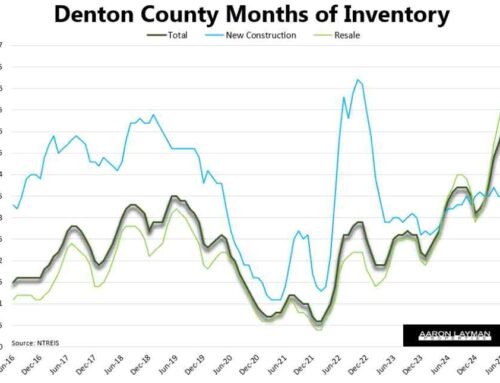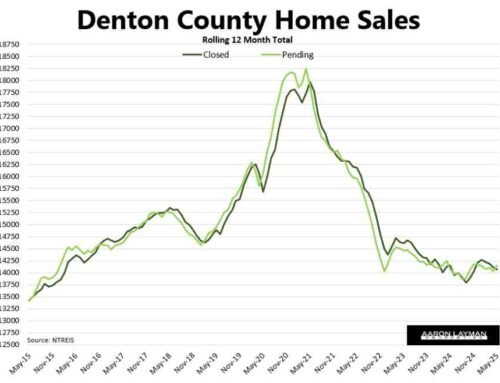On November 2020 the National Association of Realtors settled its antitrust case with the Department of Justice, agreeing to a number of reforms over how MLS boards operate. The settlement also addressed how Realtors compete in their local markets. We now have more understanding of why the case was filed, and why it was settled. The Houston Chronicle is reporting on how several Houston area agents were caught on tape steering buyers away from homes which did not offer three percent commissions.
Last year the Department of Justice announced the lawsuit against NAR and the related settlement proposal. The official release from the DOJ last year stated the following:
“The Department of Justice today filed a civil lawsuit against the National Association of REALTORS® (NAR) alleging that NAR established and enforced illegal restraints on the ways that REALTORS® compete…
The Antitrust Division simultaneously filed a proposed settlement that requires NAR to repeal and modify its rules to provide greater transparency to home buyers about the commissions of brokers representing home buyers (buyer brokers), cease misrepresenting that buyer broker services are free, eliminate rules that prohibit filtering multiple listing services (MLS) listings based on the level of buyer broker commissions, and change its rules and policy which limit access to lockboxes to only NAR-affiliated real estate brokers.”
NAR responded with a statement regarding reforms agreed to as part of the settlement.
“In accordance with the MLS system’s long-standing focus on creating an efficient, transparent marketplace for home buyers and sellers, the amount of compensation offered to buyers’ agents for each MLS listing will be made publicly available. Publicly accessible MLS data feeds will include offers of compensation, and buyers’ agents will have an affirmative obligation to provide such information to their clients for homes of interest.
Relatedly, the rule changes re-affirm that MLSs and brokerages, as always, must provide consumers all properties that fit their criteria regardless of compensation offered or the name of the listing brokerage.
While NAR has long encouraged buyers’ agents to explain how they expect to be paid, typically through offers of cooperative compensation from sellers’ agents, there will be a rule that more definitively states that buyers’ agents cannot represent that their services are free to clients.
Finally, with the seller’s prior approval, a licensed real estate agent will have access to the lockboxes of properties listed on an MLS even if the agent does not subscribe to the MLS.”
Fast forward a few months, and we have more information on why the case was settled. The broker bringing the initial lawsuit has Houston area agents on tape admitting they were steering buyers away from homes offering lower commissions.
“I won’t get any commission unless my buyer wants to do it?” Well then thank you, I will not be showing this property.”
The Houston Chronicle has a detailed piece on how the case went down. This recording of an agent balking at the prospect of showing a home without a 3 percent commission attached to it is a real eye-opener, but there are apparently other recordings as well.
Another agent was equally blunt:
“I’m not even going to show it to them, to be honest with you. I can’t help you to sell something that’s wiping out my profession.”
The discount broker who brought the case had a difficult time getting agents to show their listings in the Houston market. After collecting evidence confirming their suspicions they at one point suspended their Houston operations.
“The difficulty getting real estate agents to work with REX was especially bad in Houston, according Ryan. Not only did agents say they would not show REX homes to their clients, but the MLS also had the option to for agents to remove homes from reports generated for clients. That meant a homebuyer asking to see two-bedroom, two-bathroom properties within a certain subdivision, for example, could be sent a link with all the properties that met their criteria except the ones that offer low commissions.”
NAR, HAR and other U.S. real estate associations have revised their guidance on how things will operate moving forward. As news of the recorded conversations and unethical behavior gain more traction, calls for more reform within the real estate industry could certainly gain traction. The simple truth is that many agents have been spoiled by the old model of business. Many agents think they are entitled to a three percent commission despite rampant housing inflation. Some big name franchise brokerages depend on fat commissions to pay their large overhead expenses and keep their agents happy so they are still willing to push the old model.
As and independent broker who has sold in both the Houston and North Texas markets, I can speak to the challenges of bucking the industry norms. Change is hard, and there are a lot of agents and brokers who will fight it till their dying breath. Fighting change is one thing. Putting your own interests above that of your clients is another thing altogether.
With more competition in the pipeline U.S. agents could eventually be forced to adopt a model similar to other developed countries where buyer’s agents are not compensated by the seller. There’s a reason it remains so expensive to sell a typical home in the United States. Estate agents charge lower commissions in other developed countries, sometimes much lower. Home sellers in the UK pay estate agent fees averaging less than 1 and a half percent.
In a typical U.S. transaction, the listing broker charges a fee and a portion of that fee is offered to the cooperating broker bringing the buyer. In effect, the seller is paying both sides of a commission when there are two agents involved. Some brokerages still try to justify a 6 percent commission, even when such high expenses are not warranted.
If a broker takes a listing at less than 6 percent, someone is going to get paid less than three percent. Sometimes the broker eats the discount on the listing side and still offers 3 percent to the buyer’s broker/agent. Sometimes the split is 50/50 down the middle. It doesn’t take a rocket scientist to understand that some brokers might accept a lower listing side commission to keep the buyer side commission at 3 percent just to avoid potential steering issues. Most brokers want their listings to be shown to all prospective buyers. I remember a vehicle plate in Houston years ago that read “BTSA”. That stands for bonus to selling agent, or as I generally refer to it, an adverse compensation structure.
Will we see a day when buyer’s agents in the U.S. have to negotiate their commissions directly with buyers? The revelations from Houston suggest we could be heading in that direction. As home prices continue to move higher, it is getting harder to justify the older traditional commission structure when selling a home.
If you are looking to sell a property in Denton County Texas and save some money on commissions, give me a call. I won’t feed you a line and try to charge you an inflated commission. Change is here, and I intend to embrace it. See my page for sellers if you are interested in saving thousands in commission expenses the next time you sell your home.










I find very similar situations, as a New Home Construction salesperson, when the first question of Realtors is “is there a BTSA?” DR Horton is notorious paying BTSA’s. Realtors literally talk about only showing their homes, because of the BONUS. The BONUS is always built into the price, paid by the seller. So, WHO IS THE REALTOR REALLY working for? I just sent my inventory to a realtor, the only question he had was “is there a BTSA?” when I answered “no”, he never replied with any other questions.
That’s a sad reflection on the industry. Also one of the reason’s I’m not a fan of BTSA’s. Buyers are better served by lower home prices and better value. I wish more Realtors looked at it that way.